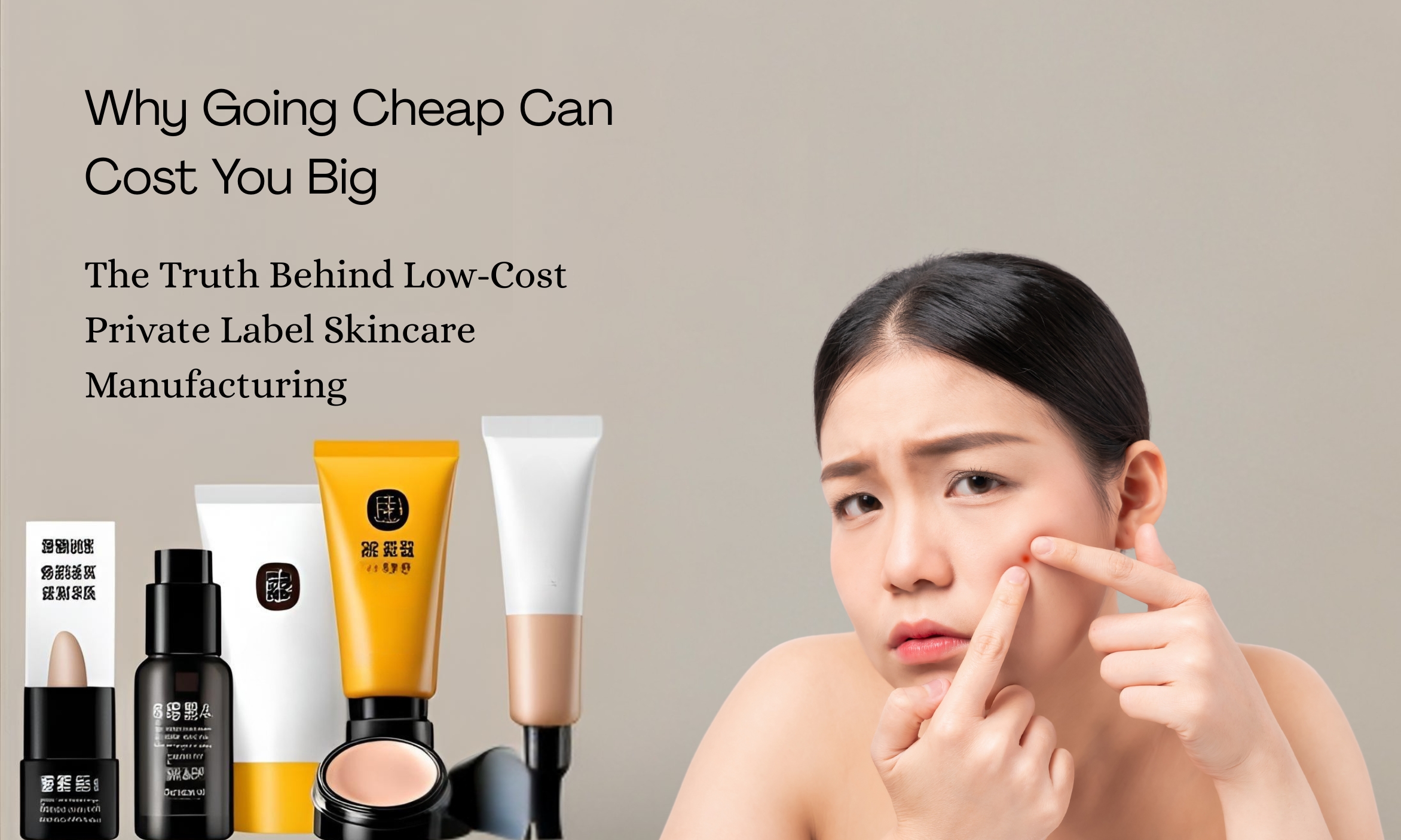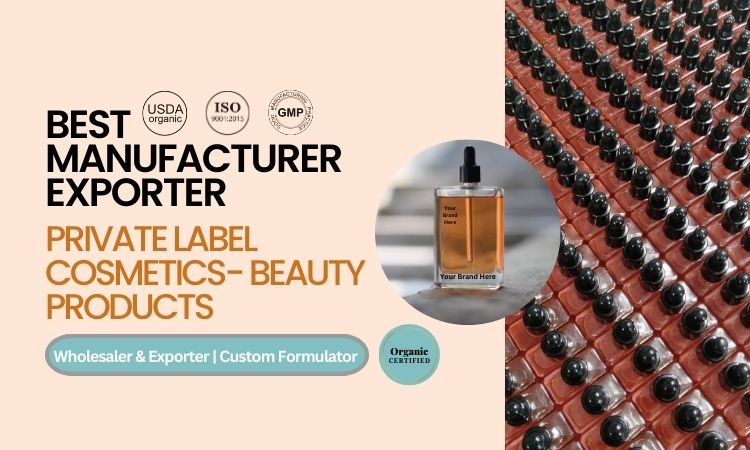
Why Going Cheap Can Cost You Big: The Truth Behind Low-Cost Private Label Skincare Manufacturing
Why Going Cheap Can Cost You Big: The Truth Behind Low-Cost Private Label Skincare Manufacturing | Compromises on Raw Materials Can Ruin Your Formula | Poor Quality Control Can Lead to Major Failures | Regulatory Non-Compliance Carries Heavy Consequences | Skipping Innovation Hampers Long-Term Growth | Cost of Rework Is Always Higher Than Right-for-Start | Reputation Damage Overshadows Cost SavingsIn the private label skincare world, many brands begin their journey by hunting for the lowest manufacturing price they can find. At first glance, low-cost makers seem ideal, lighter budgets, faster launches, and ready formulations. But behind the discounted quotes lies a much darker reality. From our vantage point as a manufacturer, we’ve witnessed far too many brands that pursued the cheapest option only to compromised quality-substandard product quality, regulatory non-compliance, unhappy customers, and ultimately, eroded reputation.
Choosing an quality conscious, researched and developed product, export ready cosmetic manufacturer may cost significantly more, but it protects you from countless downstream risks. We believe that being truly export-ready means committing to purity, safety, traceability, and compliance, no matter how competitive the price may appear. Let’s unpack why low-cost manufacturing isn’t savings, it’s a gamble.
Compromises on Raw Materials Can Ruin Your Formula
The raw materials used in skincare define its performance. In low-cost setups, ingredient quality is often sacrificed to meet pricing. Carrier oils can be used with less expensive fillers or diluted. Preservatives may be suboptimal, risking microbial growth. Botanical extracts may lack potency or authenticity.
At our facility, as a GMP certified cosmetic manufacturer India, we source only from trusted, traceable suppliers. Every ingredient batch comes with testing documentation. This ensures consistency, safety, and efficacy, even if it means slightly higher manufacturing costs. That extra degree of care prevents formulation failure, skin irritation, and product recalls.
Poor Quality Control Can Lead to Major Failures
In an effort to cut costs, manufacturers might forgo internal quality control procedures. They may skip microbial testing, skip shelf-life stabilisation, or avoid checking pH balance. As a result, products may oxidise, separate, smell bad, or cause skin sensitivities within weeks of use.
In contrast, our R&D protocols include repeated rounds of stability, contamination, and usage testing. We replicate retail storage conditions across climates to ensure each batch remains consistent. Working with an export ready cosmetic manufacturer means your product arrives at the consumer exactly as intended, no surprises.
Regulatory Non-Compliance Carries Heavy Consequences
At Aadhunik Ayurveda, we’ve observed that brands often get attracted to low-cost manufacturers who offer quick production at the expense of proper regulatory adherence. However, skincare and wellness products intended for domestic or international markets must meet strict guidelines, be it for ingredients, labeling, packaging, or documentation. Skipping this due diligence can lead to serious consequences such as product rejections at customs, costly relabeling, heavy penalties, or even bans from entering specific markets.
Unfortunately, many low-cost manufacturers either lack awareness or intentionally bypass global compliance standards. They may not provide batch records, safety documentation, ingredient breakdowns, or INCI listings, all of which are essential for export-ready skincare products.
At Aadhunik, we approach this with zero compromise. Being a certified organic and export-compliant private label skincare manufacturer in India, we ensure that every formulation aligns with the regulatory demands of the destination country. Whether it's adhering to EU cosmetic ingredient bans, US FDA guidelines, GCC halal compliance, or ASEAN cosmetic safety norms, our in-house documentation team is trained and equipped to prepare comprehensive regulatory files, including:
- INCI-labelled ingredient lists
- COA (Certificate of Analysis)
- MSDS (Material Safety Data Sheets)
- Batch-wise traceability and testing reports
- Allergen declarations and safety assessments
For every batch we manufacture, we maintain meticulous records that support brand credibility and seamless clearance across borders. With Aadhunik, brands can confidently grow beyond borders without fearing regulatory setbacks.
Skipping Innovation Hampers Long-Term Growth
Low-cost manufacturers often rely on generic formula libraries temperature insensitive to consumer trends or local climate needs. Without innovation support, brands are left with commoditized products that compete on price alone.
As an OEM cosmetic manufacturer in India, our R&D team co-creates product innovations, hydrating gels for humid climates, lightweight monsoon-sensitive serums, or antioxidant-rich creams suited to dry winters. These globally relevant, culturally aligned formulations differentiate your product and support premium pricing, something cheap won't achieve.
Cost of Rework Is Always Higher Than Right-for-Start
If your manufacturer cuts corners at the start, you often have to invest more later to correct mistakes. Reformulating due to poor performance, formulation instability, fixing labels for regulatory compliance, or repackaging due to poor packaging design all incur time and money. Brands face shipment delays, added consultancy invoices, and sometimes discarded inventory, costs not visible in the original quote.
Had the brand invested in an export ready cosmetic manufacturer from the beginning, where standards are built into the process, the downstream costs are absorbed upfront, not multiplied over repeated fixes.
Reputation Damage Overshadows Cost Savings
Perhaps the most irreversible consequence of cheap manufacturing is damage to brand trust. Customers who receive poorly performing products post early discount may share negative reviews, while suppliers cancel future shipments. Over time, low cost doesn’t become reputation, it becomes regret.
Conversely, manufacturers with consistent production quality, traceable sourcing, and validated testing protocols support brand loyalty. As a private label cosmetic manufacturer India that prioritizes long-term brand growth, we help our clients build credibility and avoid having to rebuild consumer trust later.
Supporting Global Expansion Through Proper Infrastructure
Cost-cutting manufacturers often lack the infrastructure to support large-scale or export-focused brands. They may have limited production runs, inconsistent quantity capability, or lack export-grade packaging and documentation systems.
As one of the leading skincare third party manufacturing companies India, we offer both small pilot runs and container-scale batches. Our facilities include export-specific packing zones, multilingual labelling support, and logistics channels aligned with international shipping, ensuring orders reach global retail channels intact and compliant.
Conclusion: Investing in Quality Saves Far More Than It Costs
Saving money up front may feel smart, but the hidden costs of low-price private label manufacturing far outweigh the cash saved. From compromised ingredient quality and testing shortcuts to regulatory non-compliance and lost consumer trust, working with cheap providers often backfires.
Choosing a high-standard manufacturer, whether for local or international markets, ensures product safety, stability, and compliance. As a reputable export ready cosmetic manufacturer, we deliver peace of mind and long-term brand value. Partnering with a trusted private label cosmetic manufacturer India or OEM cosmetic manufacturer in India means investing once, and reaping benefits for years.
FAQs:
Does low-cost manufacturing always imply lower quality?
Often yes, because cost-cutting typically impacts ingredients, testing, or hygiene standards.
Can cheaper manufacturing meet export requirements?
Usually not. Export requires detailed documentation, high-quality raw materials, and sanitary production standards.
Is it possible to retrofit compliance later?
No, non-compliant batches cannot be fixed after failure, which means retraining costs or product discard.
Why is batch consistency important in skincare?
Consistent batch quality builds brand trust; variability frustrates consumers and retailers alike.
How does ingredient sourcing affect manufacturing quality?
Treatment of raw materials (purity, authenticity, testing) directly influences product safety and performance.
Can low MOQ manufacturers still deliver safe products?
Yes, if they invest in testing, sourcing traceability, and process control like GMP protocols.

